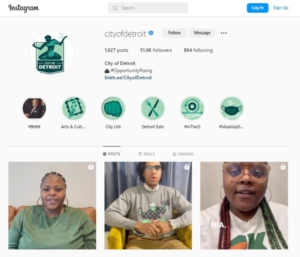Daniel Arini is a 2022-2023 Fellow at DTE where he is a Junior Project Manager on the HR Workforce Development Team. Learn more about Daniel below.
Privilege in the Wake of Crisis
Climate change, environmental injustice, COVID-19, biodiversity loss, neoimperialism, disinvestment, opioids, neoliberalism, disenfranchisement, housing affordability…the list goes on.
I know, not the most pleasant start to a blog post, but I invite you to pause. Take a moment to reflect on how these topics make you feel. How are these and other topics interconnected? How have you responded to them? Keep these questions in mind as you read on. Nowadays, we are bombarded with a myriad of converging existential crises which make it difficult not to be anxious or overwhelmed sometimes. However, I’m here to say we are not powerless, far from it.

City of Detroit Instagram Page. Consider giving them a follow!
Challenge Detroit empowered me by introducing me to Eric Thomas*, Chief Storyteller for the City of Detroit (yes, that’s a real position more cities would probably benefit from!). Eric, renowned for his vivid people-first storytelling on Instagram, inspired me to see my own power—my privilege—with fresh eyes.
Before meeting Eric, I thought of my privilege as something which got in the way of my environmentalist aspirations, either because 1. it seemed as though my efforts were in adequate or 2. I was afraid that I would be overbearing and act on assumptions. Of course, this dilemma pales in comparison to what frontline communities have to endure on a regular basis, yet if I were to be of service to anyone and live with myself, it had to be overcome.
Eric’s advice on navigating privilege was refreshingly candid and humanizing:
- Show up in a way which earns you the right to help someone.
- Share resources which happen to be derived from privilege (“that random thing” as he jokingly called it) with the marginalized. Use privilege to tear down barriers.
- Be honest and compassionate. Ask why you are doing what you are doing. What is the end goal?
- Physically go where the action is and work from there. Immerse yourself within the community you are serving, even if that merely amounts to people-watching, in order to evaluate preconceived notions.
- Challenge dominant perceptions, biases, and stereotypes.
- Including people does not mean having them lose their identities.
Still reflecting on the questions from the beginning of this piece? Eric ultimately taught me to let go. Not of the urgency or importance of our time, the need for continuous improvement, or my roots, but rather self-blame. Be accountable for sure, just don’t overthink yourself out of serving others and being well.
Although the list of crises we face goes on, the number of opportunities each one presents is so much greater. We can go on, together.
About Daniel:
Hello! I’m Daniel Arini from Plymouth, MI. I graduated from the University of Michigan – Dearborn where I received a Bachelor’s degree in Environmental Studies, concentrated in Resource Policy and Management with a Geography minor. Outside of Challenge Detroit, I enjoy helping institutions go palm oil free, volunteering with the Boy Scouts of America, and virtually anything outdoorsy.
Why should someone apply to be a Fellow?
If you want (what should be) common sense to be more common – like social justice, community autonomy, human centered design, and all around good vibes – then Challenge Detroit is for you!
*Eric Thomas has recently moved on from his role as Chief Storyteller.

